Clifford Garstang's Blog, page 51
March 15, 2015
The New Yorker: “A Death” by Stephen King
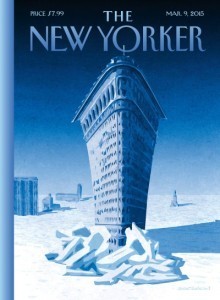 March 9, 2015: “A Death” by Stephen King
March 9, 2015: “A Death” by Stephen King
I’ve never been a fan of King’s and this story is definitely not going to change that.
Jim Trusdale is arrested for the murder of a little girl and the theft of the silver dollar the girl had in her possession, based solely on the evidence that his hat was found at the scene of the crime. He claims he lost the hat or it was stolen from the bar where he was having a drink. Despite the circumstantial evidence, Trusdale is convicted. The sheriff has his doubts, but he does nothing about it and Trusdale is hanged for the crime. Afterward, the sheriff is called by the undertaker to see that the silver dollar is in Trusdale’s excrement, which seems to be some kind of proof that Tusdale was guilty. But that would have meant, as the sheriff notes, that he swallowed the dollar when they came to arrest him and swallowed it again each time he shat it out.
But maybe—the sheriff doesn’t go there, but I think the reader might—Hines the undertaker has planted the dollar in the excrement. Possible? Such a development might have made this story interesting, but there’s no indication of it in the Q&A with Stephen King, so I guess not.
March 10, 2015
2015 Reading: Fight Club by Chuck Palahniuk
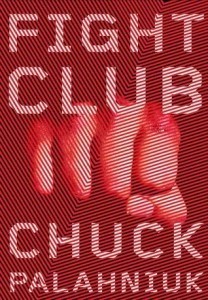 Fight Club: A Novel by Chuck Palahniuk
Fight Club: A Novel by Chuck Palahniuk
I’ve never seen the movie, but I’ve seen some of the clips, so I wasn’t prepared for the book’s complexities. I’m now willing to watch the movie, but I doubt it will measure up.
It’s tough to write a review without giving too much away, but the narrator, who is dealing with issues relating to his father, comes under the influence of Tyler, a guy who is increasingly weird. Tyler’s weirdness is moderated by the oddness of Marla, the woman with whom both the narrator and Tyler are involved.
I’m not a fan of the “transgressive” genre, which might have started with this book. Fistfights and violence get old after a while. Still, this was definitely not a waste of time.
March 1, 2015
2015 Reading: We Were Flying to Chicago by Kevin Clouther
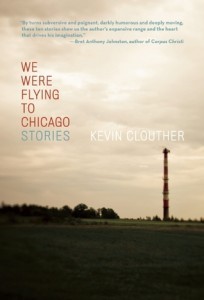 We Were Flying to Chicago by Kevin Clouther
We Were Flying to Chicago by Kevin Clouther
I might not have heard of this collection of stories except I’m going to be on a panel with Kevin Clouther and another author (Craig Bernier) at the Virginia Festival of the Book in a few weeks. Unless I’m moderating a panel like this, I rarely have the time to read the other panelists’ books ahead of time, but because I have no moderating chores at this year’s festival, I decided I would read these two books.
And I enjoyed this collection very much. It’s a mixture of realistic stories—most of which seem to end before you might want them to—and unrealistic stories that are somewhat in the vein of Haruki Murakami (minus the enigmatic cat).
An example of the first kind of story is the last one in the book, “Puritan Hotel, Barnstable.” In it, Michael has come to Barnstable to visit his brother, Connor, who is hospitalized and awaiting surgery to remove a brain tumor. Their father is present in the story—the father from whom Michael is estranged—and there is an element of lapsed Catholicism, a theme that runs throughout the book. But Michael leaves the hospital before the surgery, promising Connor that he’ll be there when Connor wakes up.
The story “Open House” is an example of the more unrealistic work in the collection, although it can also be viewed realistically. Two people—not a couple, apparently—work for an “Agency” (the CIA, I thought for a while, but maybe a Real Estate Agency) and pose as a couple interested in buying homes. They go from one open house to the next, shills that demonstrate to real potential buyers that there is competition. None of which is explained to the reader.
The stories in the collection have appeared in Puerto del Sol, Gettysburg Review, Baltimore Review, and elsewhere. It’s a fine book, published by Black Balloon Publishing, which is also new to me.
February 26, 2015
The New Yorker: “Ba Baboon” by Thomas Pierce
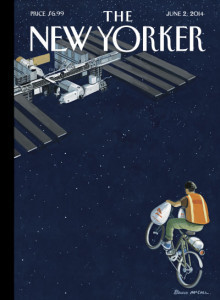 June 2, 2014: “Ba Baboon” by Thomas Pierce
June 2, 2014: “Ba Baboon” by Thomas Pierce
I’m still getting caught up on the 2014 stories and hadn’t read this one yet, so it was a funny coincidence that last night in a class that I teach in Charlottesville, VA, one of the students said that she had seen Thomas Pierce earlier in the day in a coffee shop. Pierce lives in Charlottesville, but I don’t think I’ve met him. I discussed his previous story in TNY here: Shirley Temple Three. So this afternoon I opened up this issue of TNY and there is the story by Pierce.
And I liked the story very much. One reason I liked it is that we are dropped right into the action without any explanation. We figure it out eventually, with the aid of some brief flashbacks, but we’re on our own at first. Brooks and Mary are in a pantry. Why? Because there are some dogs they’re hiding from? Brooks is a little slow? Why? Because he’s had some kind of traumatic brain injury (which we learn, in a flashback, was the result of a random act of violence). And as the story progresses we learn also that Mary has come here to her ex-lover’s home to retrieve a sex tape that she foolishly let him film.
Will they find the tape? Will they escape the dogs? Will Brooks recover? Will Mary recover from the embarrassment of the tape? Some of those questions are answered, at least. (Hint: the title is the code word to stop the dogs from attacking.)
In the Q&A with Thomas Pierce we hear more about the idea of personality changes, which Brooks has undergone because of his injury. There also has been a change in roles between Brooks and Mary, with the latter now taking care of the former, where once it was the other way around.
Pierce’s story collection came out not long ago, including both of his New Yorker stories: Hall of Small Mammals: Stories
February 25, 2015
Teaching Old and New Stories Together
 Against my better judgment, I agreed to teach a fiction workshop this winter in Charlottesville at WriterHouse. The class is fun and the “students” are all good writers, but it is kind of a pain to spend 90 minutes on the road (45 minutes each way) each week; on top of that there is the unpredictable Winter weather that always threatens to disrupt.
Against my better judgment, I agreed to teach a fiction workshop this winter in Charlottesville at WriterHouse. The class is fun and the “students” are all good writers, but it is kind of a pain to spend 90 minutes on the road (45 minutes each way) each week; on top of that there is the unpredictable Winter weather that always threatens to disrupt.
In any case, though, I agreed to do it and put together a course that I’ve written about before (Digging Deep). The main focus of the class is the workshop of student work, but I wanted to introduce learning components as well, so each session has a focus on one fiction element and we talk about that for a while to start things off. Then we look at a couple of published stories, especially with that element in mind.
For example, Setting was our topic last night. First we talked a little about various aspects of setting (place, time, and culture), and then we looked at two stories from Best American Short Stories 2014 (my source for all the “new” stories in the course). Lauren Groff’s story, “At the Round Earth’s Imagined Corners,” was helpful here, because it is largely set in a swamp, and that has significance for the meaning of the story. We also looked at Joshua Ferris’s “The Breeze,” a very New York City story, quite a different setting.
But what I’m also doing in this class is pairing the newer stories with classics, so last night we also discussed “Bullet in the Brain” by Tobias Wolff, one of my favorites. Again, our focus was on setting. This approach is working quite well, I think, because sometimes the older stories can be dismissed as being out of fashion, but in my view there is still plenty to learn from them. The newer stories are helpful, too, because we see how contemporary writers are accomplishing some of the same things.
Other pairings I’ve used in this course:
“The Lady with the Pet Dog” by Chekov and “Mastiff” by Joyce Carol Oates.
“This is Not a Love Song” by Brendan Matthews and “Patriotism” by Yukio Mishima
“Hover” by Nell Freduenberger and “The Enormous Radio” by John Cheever.
And in the coming weeks we’ll do these:
“The Night of the Satellite” by T.C. Boyle and “The Things They Carried” by Tim O’Brien
“Long Tom Lookout” by Nicole Cullen and “The Necklace” by Guy de Maupassant
“A Hand Reached Down to Guide Me” by David Gates and “Gusev” by Chekhov
February 24, 2015
2015 Reading: A Walk Across the Sun by Corban Addison
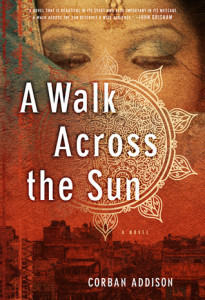 A Walk Across the Sun by Corban Addison
A Walk Across the Sun by Corban Addison
This novel is the February selection of my bookclub, Reading Liberally. Our discussion this week should be especially interesting because the author will be joining us.
The book is about human trafficking, and it is glimpsed in many of its facets here: sex work, pornography, drug transport, slavery. The book opens with the devastation of the Christmas tsunami that killed hundreds of thousands of people in Southeast and South Asia. Two young girls in Chennai, on the southeast coast of India, are orphaned and through a series of misfortunes wind up in the hands of traffickers who take them to Bombay. One is forced into prostitution and the other is taken to Paris to be enslaved in an Indian restaurant. Meanwhile, Thomas Clarke is a young lawyer in Washington DC who, for a variety of reasons, leaves DC to work as an intern for an NGO in India that combats trafficking. He takes on the challenge of helping the two girls, and the book is about that effort.
It’s a compelling story. At times, it seems unbelievably gruesome. At other times, one suspects that the author is letting us (and the characters) off easy–the reality must be far worse than what is portrayed here. But reality might make the story unreadable, and as it is the situation is infuriating. Nonetheless, the book exposes a horrifying trade that we should all work to stop. The book makes that abundantly clear.
I don’t want to give away anything about the book’s ending, but I will say I might have made some different choices. Still, it’s a very satisfying read and I recommend it.
February 20, 2015
Reading Liberally — a political bookclub
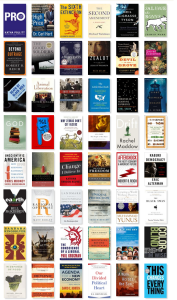 Five years ago, I started the Staunton chapter of Reading Liberally, an offshoot of the national orgazination Living Liberally (which includes the more popular group Drinking Liberally). While there are 189 official Drinking groups in the country, there are only 4 Reading groups, but we’re still going strong here in conservative-land.
Five years ago, I started the Staunton chapter of Reading Liberally, an offshoot of the national orgazination Living Liberally (which includes the more popular group Drinking Liberally). While there are 189 official Drinking groups in the country, there are only 4 Reading groups, but we’re still going strong here in conservative-land.
Our first meeting was April 15, 2010, when we discussed David Korten’s Agenda for a New Economy. The image at left shows most, if not all, of the books we’ve discussed over the years, including books on science, religions, politics, economics, history, current events, as well as some novels that cover those same topics. (I’ve also posted a list below.) Last month we read Pro by Katha Pollitt, on abortion rights. This month we’re reading a novel about human trafficking, A Walk Across the Sun, and the author, Corban Addison, will be joining us for our discussion on February 26. For March we are reading Naomi Klein’s This Changes Everything.
If you’re interested in joining our group, you can sign-up on our website: Reading Liberally-Staunton. Or you can join our Facebook page: Reading Liberally-Staunton (Facebook). From either source you’ll get information about our meetings and reading selections. We generally meet on the fourth Thursday of the month at 6:30 pm at AVA Restaurant & Wine Bar in Staunton. Be sure to let us know if you plan to join a discussion so we can alert the restaurant as to how many to expect. (Ordering food and drink is not required, although several of us do have dinner during the discussion.)
Here is a list–complete, I think–of what we’ve read over the last 5 years:
title
author
Pro: Reclaiming Abortion Rights
Pollitt, Katha
High Price: A Neuroscientist’s Journey of Self-Discovery That Challenges Everything You Know About Drugs and Society
Hart, Carl
The Sixth Extinction: An Unnatural History
Kolbert, Elizabeth
The Second Amendment: A Biography
Waldman, Michael
Space Chronicles: Facing the Ultimate Frontier
Tyson, Neil deGrasse
Salvage the Bones
Ward, Jesmyn *
Beyond Outrage (Expanded Edition): What has gone wrong with our economy and our democracy, and how to fix it
Reich, Robert B.
The Good Soldiers
Finkel, David
Those Angry Days: Roosevelt, Lindbergh, and America’s Fight Over World War II, 1939-1941
Olson, Lynne *
Zealot: The Life and Times of Jesus of Nazareth
Aslan, Reza
Devil in the Grove: Thurgood Marshall, the Groveland Boys, and the Dawn of a New America
King, Gilbert
Sacred Economics: Money, Gift, and Society in the Age of Transition
Eisenstein, Charles
Death by Black Hole: And Other Cosmic Quandaries
Tyson, Neil deGrasse
Animal Liberation
Singer, Peter
Suite Francaise
Némirovsky, Irène
The Little Blue Book: The Essential Guide to Thinking and Talking Democratic
Lakoff, George
The Varieties of Scientific Experience: A Personal View of the Search for God
Sagan, Carl
The Light Between Oceans
Stedman, M.L. *
The Case for God
Armstrong, Karen
Twilight of the Elites: America After Meritocracy
Hayes, Christopher L.
Why Zebras Don’t Get Ulcers
Sapolsky, Robert M.
The People Of The Abyss
London, Jack
Drift: The Unmooring of American Military Power
Maddow, Rachel
The Wealth of Nature: Economics as if Survival Mattered
Greer, John Michael
Unscientific America: How Scientific Illiteracy Threatens our Future
Mooney, Chris C. *
The Handmaid’s Tale
Atwood, Margaret *
The Change I Believe In: Fighting for Progress in the Age of Obama
Heuvel, Katrina Vanden
The Future of Freedom: Illiberal Democracy at Home and Abroad [Revised Edition]
Zakaria, Fareed
Aftershock: The Next Economy and America’s Future
Reich, Robert B.
Kabuki Democracy: The System vs. Barack Obama
Alterman, Eric
Eaarth: Making a Life on a Tough New Planet
McKibben, Bill
The Rational Optimist: How Prosperity Evolves
Ridley, Matt
Landmark: The Inside Story of America’s New Health-Care Law and What It Means for Us All
Post, The Washington
Unequal Protection: The Rise of Corporate Dominance and the Theft of Human Rights
Hartmann, Thom
Creating a World Without Poverty: Social Business and the Future of Capitalism
Yunus, Muhammad
The Black Swan: The Impact of the Highly Improbable
Taleb, Nassim Nicholas *
The Lacuna
Kingsolver, Barbara
Founding Faith: How Our Founding Fathers Forged a Radical New Approach to Religious Liberty
Waldman, Steven
The Conscience of a Liberal
Krugman, Paul *
Mountains Beyond Mountains: The Quest of Dr. Paul Farmer, a Man Who Would Cure the World
Kidder, Tracy
Half the Sky: Turning Oppression into Opportunity for Women Worldwide
Kristof, Nicholas D. *
Colorblind: The Rise of Post-Racial Politics and the Retreat from Racial Equity
Wise, Tim
In Defense of Food: An Eater’s Manifesto
Pollan, Michael *
Beyond Fundamentalism: Confronting Religious Extremism in the Age of Globalization
Aslan, Reza
Agenda for a New Economy: From Phantom Wealth to Real Wealth
Korten, David C.
Our Divided Political Heart: The Battle for the American Idea in an Age of Discontent
Jr., E.J. Dionne
A Walk Across the Sun
Addison, Corban *
This Changes Everything: Capitalism vs. The Climate
Klein, Naomi
February 19, 2015
The New Yorker: “Kino” by Haruki Murakami
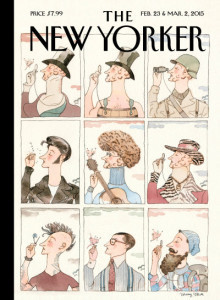 February 23 & March 2, 2015: “Kino” by Haruki Murakami
February 23 & March 2, 2015: “Kino” by Haruki Murakami
The story is about a Japanese man who works for a sporting goods company in Tokyo. He returns from a business trip a day early to find his wife in bed with a colleague from his company. Not as upset about it as he thinks he should be, he leaves takes refuge at his aunt’s home as she is moving to the countryside for retirement. He takes over her café and turns it into a bar.
Things are good for a while. He plays jazz records on the stereo. A stray gray cat adopts his bar and is good luck. He has some regular customers, including the mysterious Kamita (who is very precise about what his name means – Kami for god, ta for field). One day the bar is bothered by a couple of yakuza, but Kamita takes care of them. Kino isn’t to ask how. But then: Kino sleeps with a woman who is victim of abuse, but she returns to his abuser. The cat disappears. Kino’s wife comes to settle their divorce and apologizes. Snakes start appearing. Kamita comes by and tells Kino he needs to leave for a while and that he should send postcards to his aunt without messages. Kamita will tell him when it is safe to return. Kino does leave, but he hunkers down in a small hotel. There is an insistent knocking at the door and a voice whispers in Kino’s ear. He realizes that in fact he was hurt by what his wife did to him.
Although I haven’t read a lot of Murakami, this feels pretty typical. The mysterious cat, for example, shows up a lot, I gather. I don’t think I have any more to add, but if you Murakami fans out there could offer some guidance, we’d appreciate it.
February 17, 2015
The New Yorker: “Camilo” by Alejandro Zambra
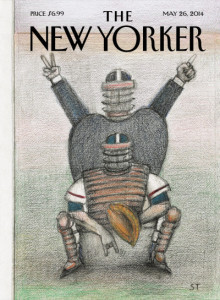 May 26, 2014: “Camilo” by Alejandro Zambra
May 26, 2014: “Camilo” by Alejandro Zambra
In this story, the narrator is a young boy when his father’s godson comes to visit for the first time. The godson, Camilo, is the son of Big Camilo, an exile from Chile who is estranged from the narrator’s father. (As it turns out, the estrangement is because of an argument about soccer, about which everyone seems quite passionate, except the younger Camilo.) Young Camilo visits often and also saves money so he can go visit his father in Europe.
Camilo is like an older brother to the narrator, helping him to overcome his shyness, teaching him about girls. Eventually, Camilo does go to Europe.
Many years pass, and now the narrator is visiting Europe. He meets up with Big Camilo, who sends his apologies to the narrator’s father concerning their old argument. It is then that we learn that Camilo, soon after his visit to his father, was killed in an accident in Chile.
The story makes frequent reference to the political situation in Chile. Big Camilo had been arrested, beaten, and then allowed to leave the country. Everyone seems unable to really express themselves, which perhaps is why they are so passionate about soccer, and why young Camilo, who has no trouble expressing himself, doesn’t seem to care about the sport.
From the Q&A with Alejandro Zambra we learn that the character of Camilo is based on the author’s father’s actual godson, and that he really admires the character—an interesting way of speaking of a fictional creation.
February 16, 2015
2015 Reading: The Elegance of the Hedgehog by Muriel Barbery
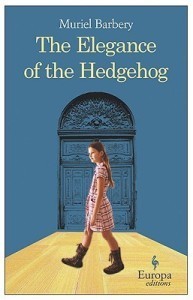 The Elegance of the Hedgehog by Muriel Barbery
The Elegance of the Hedgehog by Muriel Barbery
I’m not sure what to think of this book. On the one hand, I recognize that much of the writing is inspired, if not brilliant. I admire its explorations of class and philosophy and art and language. On the other hand, its two narrators are among the most annoying in all of literature, one for her self-righteous snobbery (toward the upper classes she knows are inferior to her) and the other for her intolerable precociousness. They both grow on you, but not if you throw the book across the room first.
Renée Michel is the long-suffering concierge of a Parisian apartment building occupied by the rich and powerful. Paloma Josse is the young daughter of one of those occupants. Renée grew up poor and has never had the luxury of school, but is an autodidact with eclectic tastes in art, music, cinema, literature, etc. Perversely, though, she feels she must hide her considerable intelligence from the residents of the building, who would not be able to handle the contradiction of a smart concierge. Then there is Paloma, who also thinks she’s too smart for her own good and plots her suicide as a way of punishing all those around her. Eventually, they discover each other (it is Paloma who thinks of the concierge as being solitary and deceptive, with the elegance of the hedgehog) and also come under the influence of a new resident, the wealthy Mr. Ozu. To go much further would be to spoil the plot, so I’ll leave it at that.
I will say, though, that I was not satisfied with the book’s ending. Ending a book is not easy, I realize, and it’s hard to imagine an ending here that would be satisfying. Or maybe the experience of coming to the end of the book is too fresh in my mind to fully appreciate. I might need to think about it more.
In any event, I’m very glad I read this book. (And by read, I mean that I listened to the audiobook—very ably performed—and also skimmed the text, which was helpful to be able to visualize the French names throughout.)




